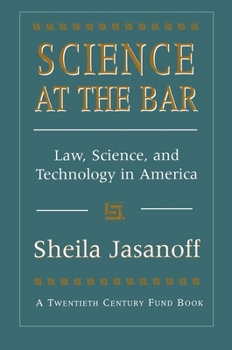Science at the Bar: Science and Technology in American Law
Select Format
Select Condition 
Book Overview
Issues spawned by the headlong pace of developments in science and technology fill the courts. How should we deal with frozen embryos and leaky implants, dangerous chemicals, DNA fingerprints, and genetically engineered animals? The realm of the law, to which beleaguered people look for answers, is sometimes at a loss--constrained by its own assumptions and practices, Sheila Jasanoff suggests. This book exposes American law's long-standing involvement...
Format:Paperback
Language:English
ISBN:067479303X
ISBN13:9780674793033
Release Date:September 1997
Publisher:Harvard University Press
Length:304 Pages
Weight:0.95 lbs.
Dimensions:0.7" x 6.1" x 9.2"
Customer Reviews
2 ratings
Clear, well-researched & useful
Published by Thriftbooks.com User , 18 years ago
Sheila Jasanoff writes books that are well-researched, clear and useful for people in a variety of areas: public policy, science studies, law & society, biotech/analysis. I have read most of her books, and recommended this to (advanced) students, who also found it very useful. I probably would not have bothered to review it here: it is obviously good, and has been well received elsewhere. But I felt moved to counteract (what I regarded as) the highly misleading negative review printed below.
Undoing Junk Science
Published by Thriftbooks.com User , 24 years ago
This really excellent book should be required reading for every lawyer who expects to handle expert evidence. Sheila Jasanoff's scholarly and reflective analysis will tell you far more about the law's construction of science than any of Peter Huber's musings (or, if you will, rantings) on the subject.Readers will find Jasanoff's critique of the leading cases of Frye v United States and Daubert v Merrell Dow Pharmaceuticals, Inc particularly helpful in understanding the law's constuction of expertise. Jasanoff does not descend to the dust of the arena as Huber does but that does not mean that she avoids trenchant criticism. Her views are nicely understated. For example, she notes that the majority opinion in Daubert was drafted by Justice Blackmun, "regarded at that time as the court's leading authority on science". She has the good taste not to remark that Blackmun was a mathematician and that most of his expertise in science was founded on little more than that he came from a family of physicians. This background also gave rise to the pseudo-medical privacy analysis (rather than an equal protection one) employed in Roe v Wade and has been the cause of many of that case's subsequent woes. Her evaluation of the worth of Daubert can be seen in her phrase "Daubert's fine disregard for a philosophically coherent decision rule on admissibility may exemplify the common law's genius for muddling through..."Readers who have enjoyed Jonathan Harr's A Civil Action will find much of interest in her chapter entitled "Toxic Torts and the Politics of Causation". Her treatment of genetic patents and of brushes between the law and genetic engineering is illuminating and topical.In summary, this book is a very satisfying and readable treatment of a topic that most lawyers and judges find indigestible. Highly recommended.






